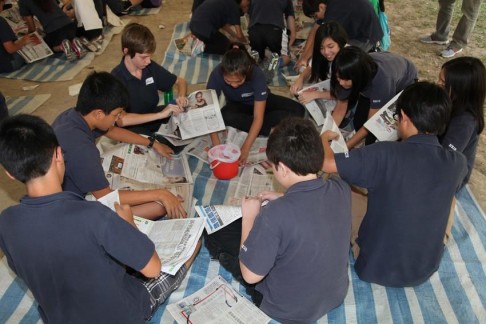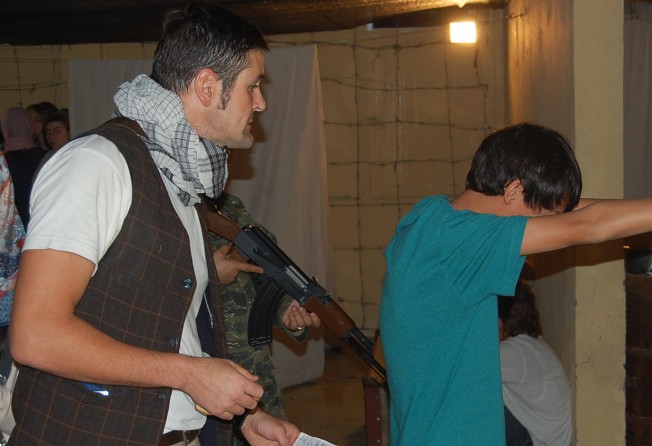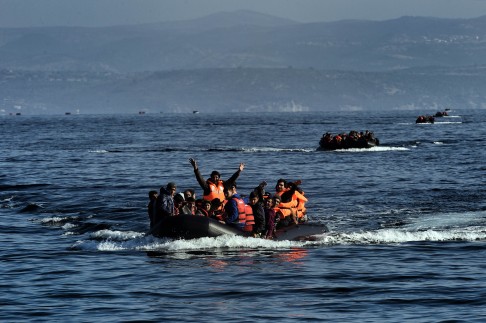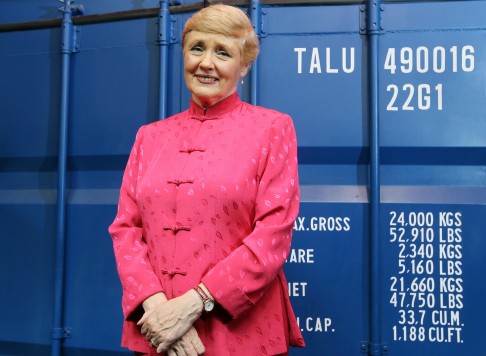
Hong Kong students get taste of scary world of the poor and displaced
Simulating life as refugees and slum dwellers proves to be a moving experience for local teens

[David Begbie, Class of 1994] When Ananya Jain and her schoolmates visited Crossroads Foundation last year, most expected a talk about the work of the local NGO. Instead, the students from Hong Kong International School (HKIS) were whisked to former army barracks in Tuen Mun where they were given new identities - as refugees.
Over the next few hours, the teenagers were immersed in simulated scenarios that refugees worldwide (now an estimated 43 million, according to the UN) find themselves in - fleeing bombing and military attacks, putting up temporary shelters, queuing up for food in camps guarded by hostile fighters.
Things got particularly scary when "soldiers" told the girls to come out of their tents - a possible prelude to being trafficked into prostitution. Although the girls didn't want to, the guards with big guns eventually intimidated them into complying. "When all of us heard 'the simulation is over' I can't explain what a relief it was," recalls Ananya, 15. "I've never been so scared in a simulation."

The ninth graders had been taking part in Refugee Run, one of a series of Global X-perience simulation programmes designed to cultivate empathy and understanding of world issues such as poverty, war and hunger. To ensure realism, the experiences are developed in close consultation with people who have lived through those harrowing circumstances, says Sally Begbie, who co-founded Crossroads 20 years ago with her husband, Malcolm.
"Refugees guide our simulations, telling us how the soldiers should be, the story should develop and the set constructed," she says.
The couple's eldest son, David, now leads the Global X-perience charge.
The first experience, dubbed Slum Survivor, was created as a one-off event to mark Crossroad's 10th anniversary in 2005, when local business and community leaders were invited to spend 24 hours living in simulated poverty. It made such an impression that participants were soon urging them to turn it into a regular event; "They said, 'It is more powerful than any programme on poverty we have ever done; others will want to do it'," Begbie recalls.
Since then, more than 150,000 people have participated in X-periences worldwide, including a yearly programme organised at the request of the World Economic Forum for the international figures attending its annual meeting in Davos.

"Participants often tell us that when they have a chance to experience these things for themselves, even briefly, they empathise in ways they never have before," Begbie says.
Closer to home, HKIS teacher Marty Schmidt has been incorporating Global X-perience into his Humanities I in Action course.
Schmidt finds students typically divide the world into two arenas: their lives, which are generally comfortable; and those of the unfortunate people that they see on TV or read about in the newspapers.
"Experiences like the Refugee Run blur the boundaries, and for the first time they have to reckon with the fact that only through circumstance did they end up in their privileged position. The joining of these separated worlds brings a rush of energy and a range of emotions," he says.
Taina Puddefoot, a 15-year-old HKIS student who has taken part in two X-periences, agrees.
Despite some "terrifying" moments, she finds the simulations to be eye-opening encounters.
"It is so crucial, as an educated young person, to recognise the difference between my life and someone whose life is at great risk. Knowing that comparison sets you up for an intelligent and broad worldview that captures the realism of society," Taina says.
Melanie Adamson, a family photographer, says privileged children in Hong Kong often need to be reminded that there are people living in poverty.
Although her daughters have not participated in Global X-perience, they have helped organise donations of clothing and stationery to Crossroads.
It is so crucial, as an educated young person, to recognise the difference between my life and someone whose life is at great risk
The volunteering has helped her children learn about people in need and how Crossroads helps them in a very tangible way, says Adamson. "It was great to see the enthusiasm the girls had to help others."
The NGO generally receives donations of high-quality superfluous goods, often brand new - anything from clothing, books and educational toys to office and medical equipment, electrical items and even vehicles. About 40 per cent of the material is distributed internationally, and the remainder goes to people in need in Hong Kong, Begbie says.
Sally and Malcolm Begbie hadn't intended to set up an NGO. Responding to a call to help flood victims in northern China in 1995, they received such generous donations from Hong Kong that what was meant to be a one-time initiative turned into a full-time operation.
Today, Crossroads is run with the help of 70 full-time staff and thousands of volunteers operating in more than 120 countries. Their services have expanded from donated goods and a fair-trade marketplace to a platform connecting charities with supportive companies.
But the NGO now faces a major bump on the road. They must soon vacate the 600,000 sq ft government site in Tuen Mun that they now occupy as the land is being sold, and an alternative site has yet to be found.

"Our goal is to construct Global Village: a welfare and humanitarian hub that will be home to all our services and where more families and groups can have the opportunity to engage with people in poverty and act for change," Begbie says. Crossroads has worked with about 400 schools in Hong Kong, and students who take up its service opportunities and simulation experiences find they can have a profound impact.
Ananya Jain, for one, says it has inspired her to work towards a purposeful profession.
"All that refugees have to live on is hope that maybe tomorrow will be a better day. After Refugee Run, I want to keep alive the only thing that keeps them alive: hope," she says.
"My goal in life has become to help people maintain hope in times of trouble, and battle through their everyday struggles.
"If I'm able to save one life, just by talking to the person, then I've earned more satisfaction than any money can buy me."